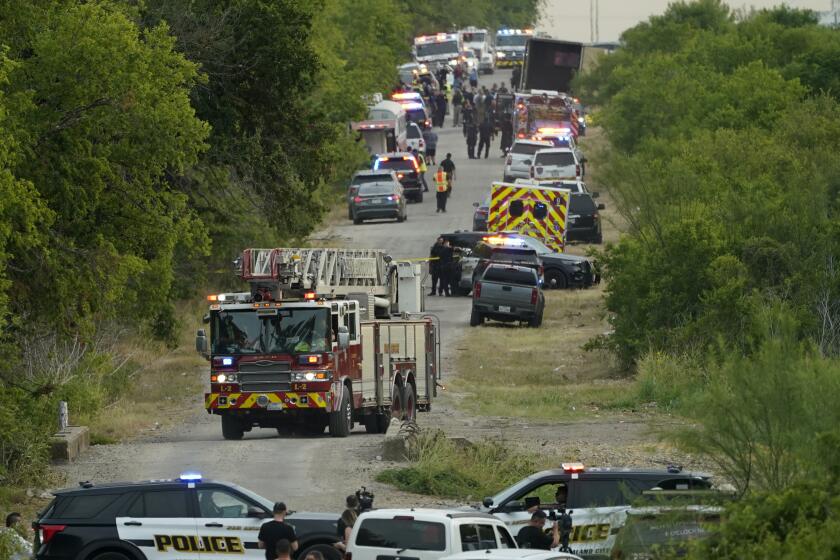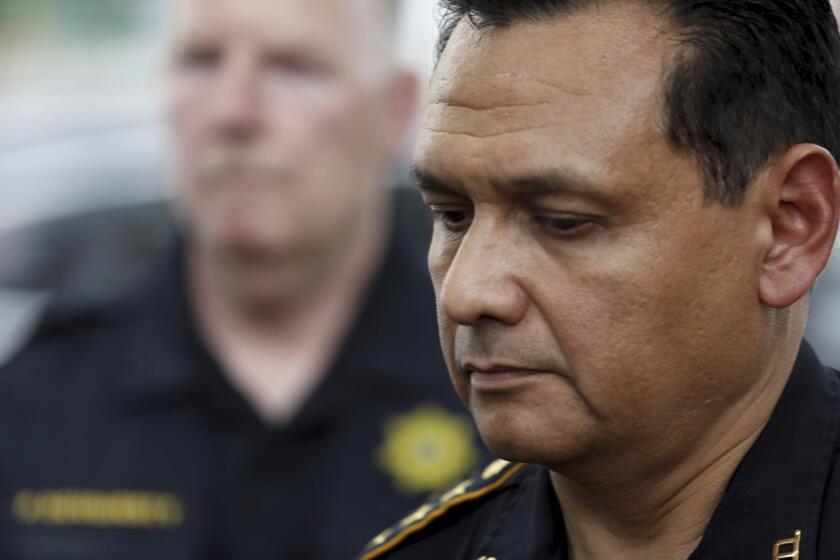‘We are in mourning’: 51 migrants die after a stifling tractor-trailer is abandoned in Texas

Federal agents have detained three people believed to be a part of the ‘smuggling conspiracy’ that left at least 50 migrants dead.
- Share via
SAN ANTONIO — The number of migrants who died after being abandoned in a sweltering tractor-trailer in Texas rose to 51 on Tuesday in what may be the deadliest human-smuggling incident in U.S. history.
As federal investigators sought to connect the tragedy to the sprawling human trafficking networks that span from Central America to the United States, they announced that three people had been detained in connection with the case.
Two Mexican nationals in the U.S. illegally — Juan Francisco D’Luna-Bilbao and Juan Claudio D’Luna-Mendez — were charged with illegal possession of firearms after police traced the truck’s registration to a San Antonio address and then surveilled the house, according to criminal complaints filed against them. The other suspect is a U.S. citizen who allegedly drove the truck and fled to a nearby field, where he was taken into custody and then hospitalized, according to a law enforcement source.
World leaders including Pope Francis and President Biden weighed in on the tragedy, with the pope urging prayer “for these brothers and sisters who died following their hope of a better life.”
The dead include at least 27 Mexican nationals, seven Guatemalans and two Hondurans, Mexican officials said. “We are in mourning,” Foreign Affairs Secretary Marcelo Ebrard wrote on Twitter.
The tragedy is sure to fuel debate over illegal immigration, an issue that Texas Gov. Greg Abbott has exploited politically as he seeks reelection this year. He has stationed National Guard troops and state police along the border with Mexico and bused migrants to Washington to spotlight what he calls President Biden’s “open-border policies” — even as many Trump-era immigration policies remain in place.
Responding to the deaths, migrant advocates renewed calls for more legal pathways to enter the U.S. as well as harsher punishment for human traffickers on both sides of the border.
The trailer was discovered Monday evening near a stretch of railroad tracks in an industrial section of San Antonio after a worker heard a cry for help, San Antonio Police Chief William McManus said. The worker opened the doors, found “a number of deceased individuals inside” and called police.
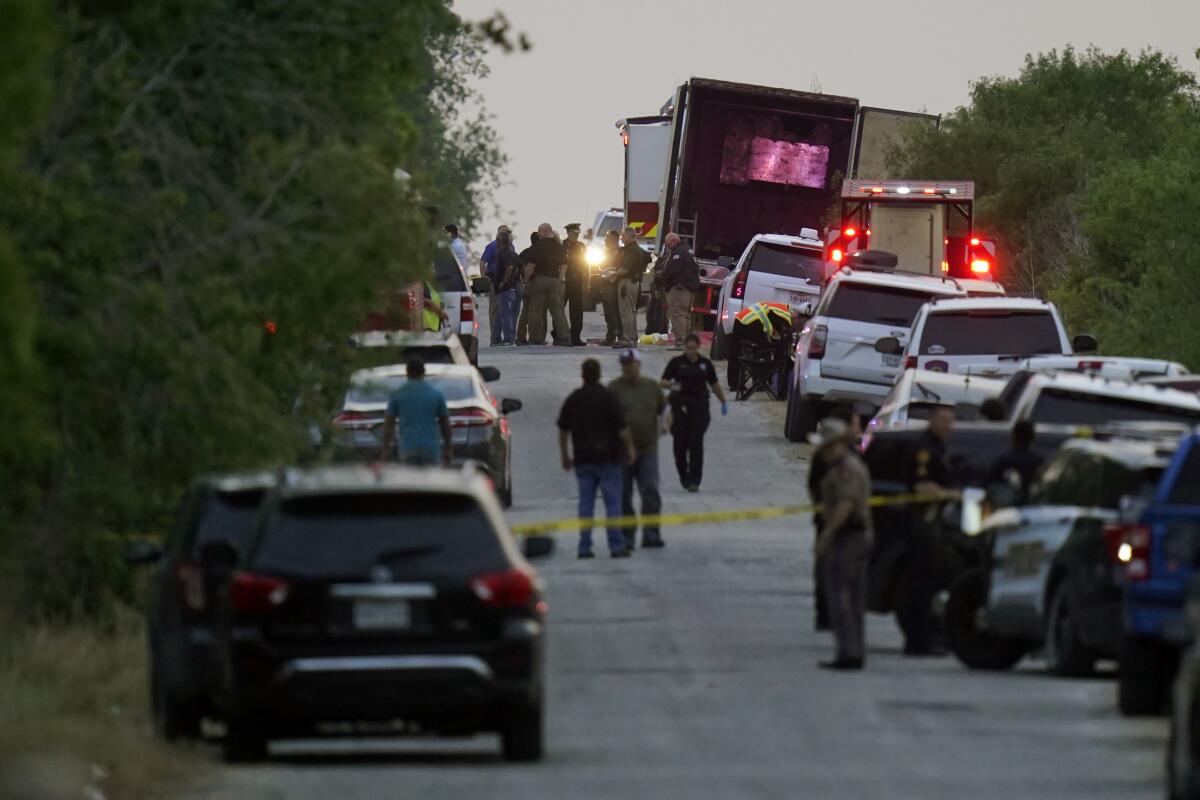
First responders discovered 46 migrants dead in the truck along with 16 survivors — 12 adults and four minors — who were taken to hospitals. The survivors were too weak to exit the trailer on their own, said San Antonio Fire Chief Charles Hood, who described their bodies as “hot to the touch” and said there was no sign of water or working air-conditioning in the vehicle. Temperatures in San Antonio on Monday hovered around 100 degrees.
Bexar County Commissioner Rebeca Clay-Flores, who represents the area, visited two of the survivors at University Hospital on Tuesday — an adolescent boy in critical care whose nationality hadn’t been determined and a 23 year-old woman who said she had left Guatemala three weeks ago.
The woman, who had just had a breathing tube removed, told Clay-Flores that she had been traveling with her brother in the tractor-trailer.
“She said she felt weak and she was trying to look for him and then she fainted,” Clay-Flores said. “She said: ‘I don’t know anything about my brother.’”
The deaths of 46 people in San Antonio were apparently the latest in a global series of mass deaths by suffocation during human-trafficking attempts.
Judge Nelson Wolff, a former mayor of San Antonio, said the local sheriff told him he believes the truck came from Laredo, a border city 150 miles to the south, and had to pull over because of mechanical problems.
After helping migrants cross the border on foot, smugglers frequently ferry them north in car trunks or tractor-trailers to avoid detection at migrant checkpoints that dot southern Texas, said Stephanie Leutert, director of the Central America and Mexico Policy Initiative at the University of Texas at Austin.
The vehicles are often bound for San Antonio, she said, where migrants are dropped at safe houses and later transported to other parts of the country.
On Tuesday, investigators and residents were searching for clues along the brush-lined Quintana Road, where the tractor-trailer was discovered.
About a mile away, the owners of Leo’s Truck & Trailer Repairs were reviewing their surveillance camera video.
Cynthia Rocamontes, who owns the shop with her husband, said she had been headed to lunch shortly before 11 a.m. Monday when she saw several SUVs speed by.
It was a rare sight on these deserted roads. So on Tuesday, she summoned her daughter-in-law and grandson to help her scroll through the footage.
“All right look, look!” Cynthia exclaimed when the first SUV appeared. They counted six SUVs, the drivers obscured by tinted windows, front license plates difficult to read.
“Those were the pickup people,” her grandson, Aydyn Rocamontes, speculated. At age 11, he already knew how smuggling operations worked.
“It’s where we live,” his mother, Shelly Rocamontes, explained. “We talk about stuff like that.”
The family wondered whether the truck’s driver may have detoured from Interstate 35, a major smuggling artery that is a straight shot north from Laredo.
Police were still searching the lots abutting Quintana Road with dogs Tuesday, business owners said.
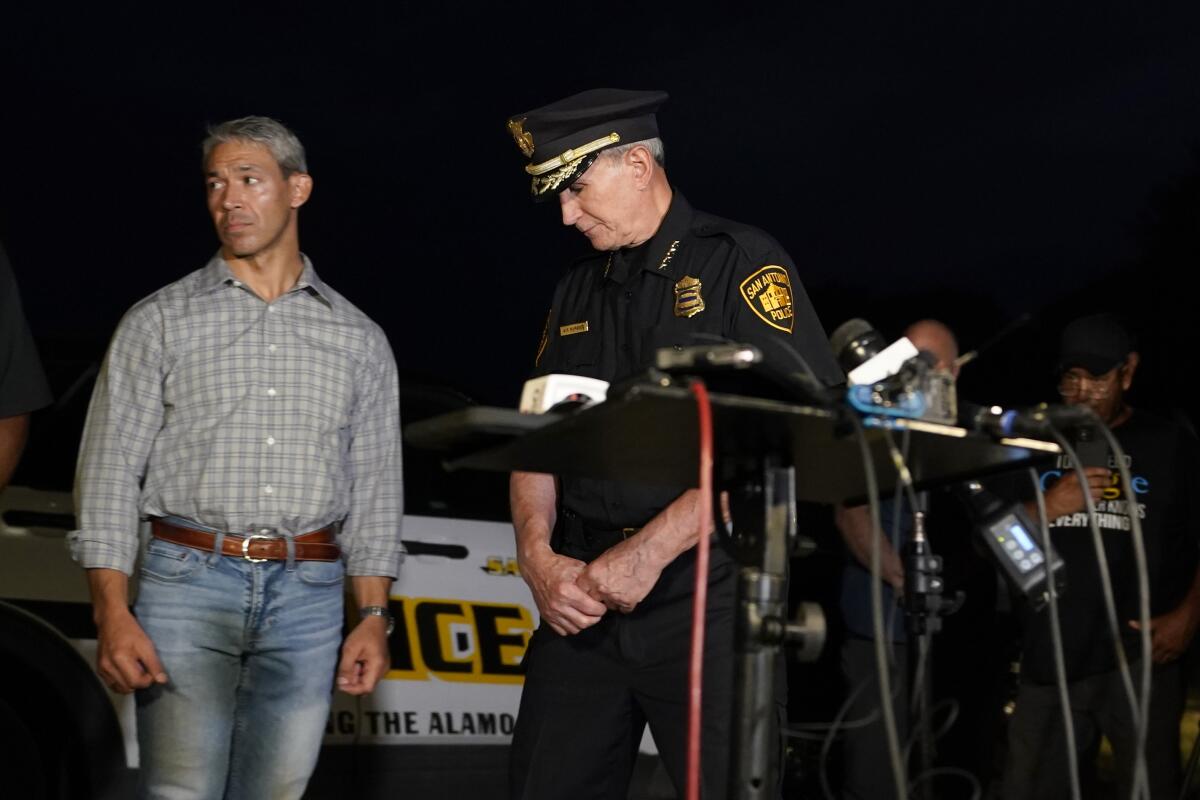
Tony Bokanian said he found police behind his A-1 Salvage yard soon after they discovered the tractor-trailer Monday.
Standing atop the bed of his truck, Bokanian said he could clearly see the back of the trailer. By then, police had removed several bodies and covered them with yellow sheets, he said.
“I saw the bodies, two heads,” he said. “They were young kids: 20, 21.”
Bokanian immigrated to the U.S. from Iran with a student visa in 1999, became a citizen five years later and is raising his three children in San Antonio.
He said he realizes his experience was different from that of migrants coming from Mexico and Central America. “There should be a better system” to enter the U.S. legally from those countries, he said. “The way it’s going is very dangerous.”
The migrant trail has grown increasingly perilous in recent decades, and the number of migrants relying on smugglers has exploded. Deadly accidents are common.
More than 650 people died while trying to cross the U.S.-Mexico border last year, according to the United Nations’ International Organization for Migration.
In 2017, 10 people died after they were left in a tractor-trailer outside a Walmart in San Antonio. The driver, James Matthew Bradley Jr., was sentenced to life in prison without parole.
In 2003, 19 migrants died after they were abandoned in a trailer at a truck stop south of San Antonio. The driver, Tyrone Mapletoft Williams, was convicted and is serving a sentence of nearly 34 years in prison.
Harris County Sheriff Ed Gonzalez was nominated by President Biden to be director of Immigration and Customs Enforcement in April 2021.
Guatemalan President Alejandro Giammattei on Tuesday called for stiffened sentences for smugglers.
“It is inexcusable that innocent lives continue to be lost to migrant smuggling!” he wrote on Twitter. “It is imperative that mechanisms are found to toughen sentences and that smuggling is a crime for which perpetrators can be extradited.”
Mexican President Andrés Manuel López Obrador said Tuesday that his country was ready to support the investigation. “I want to express my deepest condolences to the families of Mexican, Guatemalan and Honduran migrants who died yesterday asphyxiated in a trailer,” he said, adding that he plans to address the incident during a meeting in Washington next month with Biden.
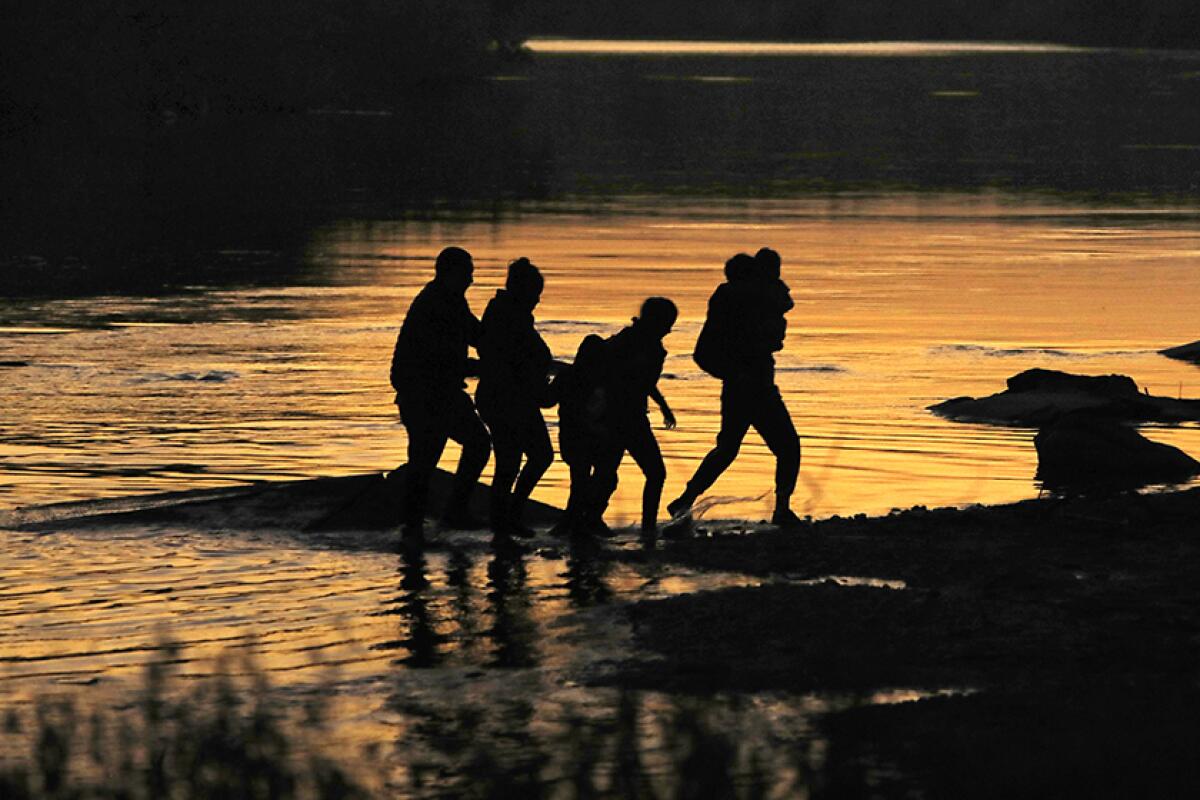
In a statement, Biden, who is in Europe for G-7 and NATO summits, blamed smugglers for the tragedy, saying they “have no regard for the lives they endanger and exploit to make a profit.”
“This incident underscores the need to go after the multibillion-dollar criminal smuggling industry preying on migrants and leading to far too many innocent deaths,” Biden said.
But migrant advocates said U.S. border policies push migrants into smugglers’ arms.
“The Biden administration should see this heartbreaking tragedy for what it is: a clarion call to abandon deeply flawed and dangerous immigration policies,” said Wendy Young, the president of migrant advocacy group Kids in Need of Defense.
Breaking News
Get breaking news, investigations, analysis and more signature journalism from the Los Angeles Times in your inbox.
You may occasionally receive promotional content from the Los Angeles Times.
“This most recent tragedy and the disturbing rise in migrant deaths globally underscore the need to create safer pathways to protection for refugees.”
In recent years, U.S. border enforcement has targeted not only economic migrants seeking work but also asylum seekers in search of protection.
Title 42, which former President Trump invoked in 2020 on the grounds of preventing the spread of COVID-19, allows border authorities to immediately expel migrants, even if they say they want to seek asylum in the U.S. Since it was put in place, the U.S. has expelled migrants more than 2 million times.
The Biden administration sought to lift Title 42 this year, but its efforts were blocked by a judge after two dozen states sued.
Eunice Rendón, a migrant activist in Mexico, said a variety of measures are needed, arguing that authorities should target not only smuggling networks, but the officials in Central America and Mexico who help them.
At the same time, she said there should be more information sharing between law enforcement agencies in every nation as well as a comprehensive plan that would allow some migrants fleeing violence or economic despair passage to the U.S.
“These tragedies happen again and again,” she said. “They show the utter failure of immigration policy in the region.”
Hennessy-Fiske reported from San Antonio, Linthicum from Mexico City and Aleaziz from Healdsburg, Calif. Times staff writers Richard Winton and Gregory Yee in Los Angeles and Cecilia Sánchez in Mexico City contributed to this report.
More to Read
Sign up for Essential California
The most important California stories and recommendations in your inbox every morning.
You may occasionally receive promotional content from the Los Angeles Times.
